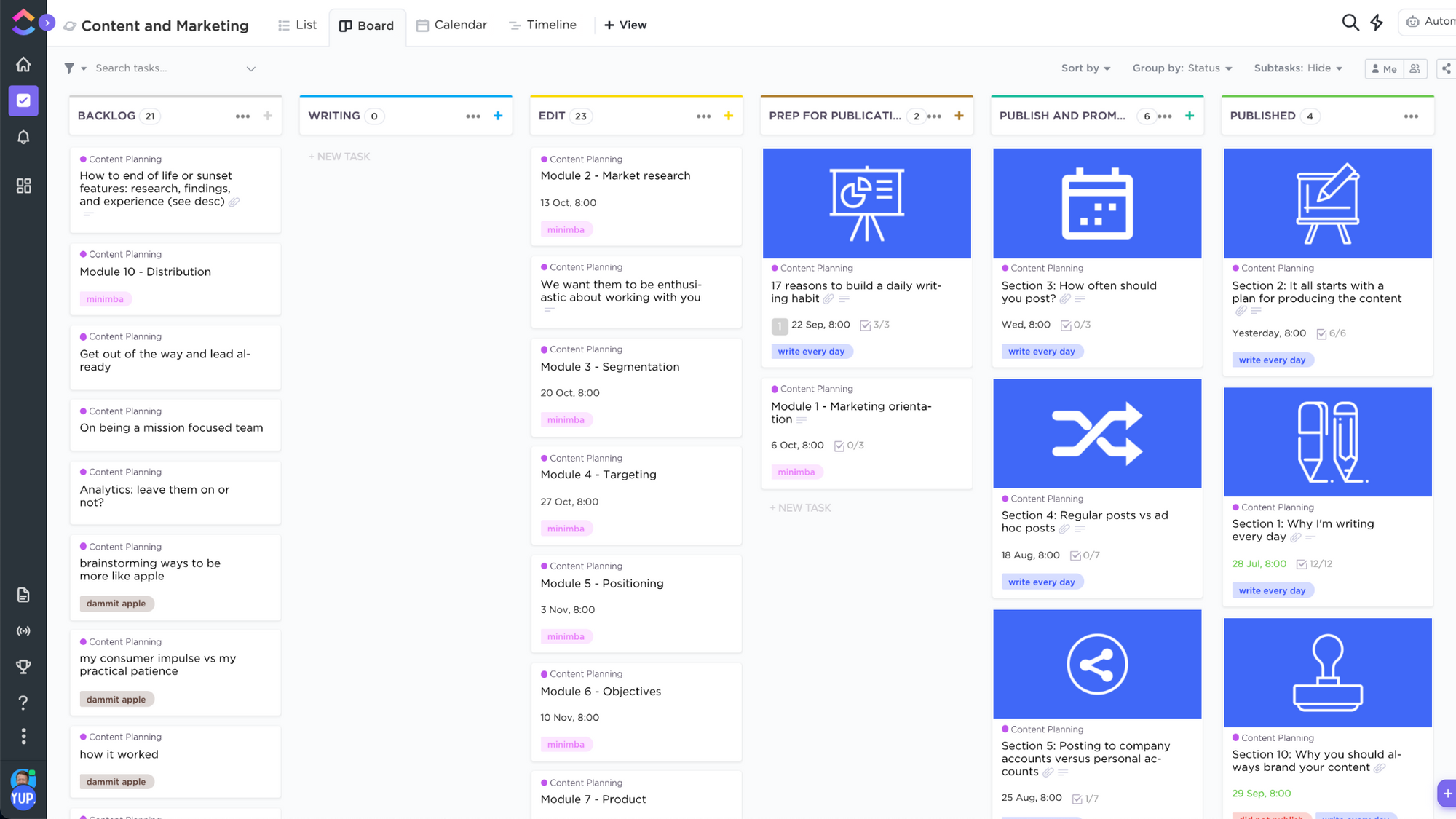17 important lessons I learned from building a daily writing habit

After writing almost every day for the past eight months, it felt like a good time to celebrate and reflect on this new habit. This post is the last in a series on building a daily writing habit and it's a simple list of things I've learned along the way.
If you're new here and would like to learn why and how to build a daily writing habit yourself, start with this post: How I went from 0 to 36,359 words written in a month.
Here are the 17 lessons:
- The habit takes time to build, but it's worth it
- Routine matters
- Systems matter
- I'm excited to write
- I miss it when I don't do it
- Some days are shit
- Writing makes me a better student
- This is the only way to start a blog
- It takes deliberate practice to get better
- Writing is like therapy
- Publishing internally is also important
- Not everything gets published
- It can feel overwhelming
- Boundaries allow for more creativity
- I can experiment with a lot of ideas
- I can do this
- I want to keep going
1. A daily writing habit takes time, but it's worth it
Writing every day wasn't easy at first, but the longer I kept the streak alive the easier it got to sit down and do it. This list of lessons is a testament to how much I feel I've learned and I hope it can inspire you to write more, too. Building a daily writing habit hasn't all been sunshine and cold beers - as you'll see below - but it has been rewarding in more ways than I could have imagined at the start.
2. Routine matters when building a habit
As James Clear says in Atomic Habits "When situation X arises, I will perform response Y."
My writing habit doesn't just happen any time. I write first thing in the morning and that actually starts the night before.
There are three things I do every night:
- My Aeropress and coffee cup are set on the counter, ready for me to fumble in the dark and make a cup of coffee in the morning
- I close all applications on my laptop except for iA Writer open to the doc I'm going to write
- I go to bed by 10pm
I get out of bed at 5am, boil the kettle, and make a cup of coffee. Then I sit down and write. This little habit stack makes writing work for me and I can't imagine having success without it.
3. Systems matter

Knowing what to write and when has been incredibly helpful in getting started. My earlier attempts at writing failed bigly because I didn't know what to write. With a system in place I can follow my daily writing habit routine without having to think too much about it.
Having the system laid out on a kanban board in ClickUp means I know exactly where everything I've written is and what I need to do to get it published. I couldn't keep up this habit without it.
If you'd like to see exactly how I setup my writing system, comment on this LinkedIn post and I'll share it with you.
4. I'm excited to write
There were days when I wasn't excited to get out of bed (and some days I sleep in because sleep-ins are awesome), but most days I'm excited to sit down and write. I began getting excited about writing when I started keeping track of how many words I was writing.
I don't keep a word count anymore, but that's what kept me going when I was starting this habit. Now I look forward to writing every morning, knowing that the word count will come.
5. I miss writing when I don't do it
A day doesn't feel complete if I don't write something. It's a strange feeling, but I like it. There are days when I just can't do my morning routine (sick kids, early work calls, aforementioned sleep-ins) and it leaves me with this feeling like something is missing.
This is a good sign. It means I'm enjoying writing and it's now a built-in habit.
On days when I don't get through the morning routine, I still write something. I stole James Althucher's idea to write 10 ideas every day and even if that's the only writing I do, it feels good.
6. Some days are shit
Yup. Some days just don't go according to plan. I'll get up, make a coffee, sit down and... nothing happens. The words don't always come and the writing isn't always great.
The best way I've found to handle this is to set 20 minute timer. I force myself to sit at the keyboard for 20 minutes, writing something. It's can be a pile of gibberish, but it's still writing.
7. Writing makes me a better student
You've probably heard that teaching is the best way to learn something. Writing is like teaching and the more I write about a topic, the more deeply I feel I understand it.
If there's something I need to learn for work, I find something to read about it and then I write about it. What did I learn? What do I think about it? How does it impact my work? Who do I know that would benefit from knowing this too?
Writing helps me process what I learn and I'm a better student for it.
8. This is the only way to start a blog in peace
I have eight months of content written now. As I'm writing this, I haven't published any of it but I will soon. And I'm going to schedule it to go out once a week for the next eight months. That feels amazing and the stress of hitting a deadline has gone away. Building a big backlog is the best way to start a blog.
Some writing should be published right away, so while I've written about things that shouldn't change, I've also written about more timely topics. Here's how I think about planned vs ad hoc posts.
9. It takes deliberate practice to get better at writing
In her book Bird by Bird with "some instructions for writing and life," Anne Lamott says this of practice:
I mean, you can’t just sit there at your desk drooling. You have to move your hand across the paper or the keyboard. You may do it badly for a while, but you keep on doing it.
I can sit down and write thousands of words and have nothing worth publishing. This piece may be one of those, but I'm going to press publish anyway because this is part of my practice. I've spent too long drooling.
Writing more helps and feedback is important, too. Publishing and sharing is one way to get feedback and I hope you'll share some with me so I can sit with it, reflect on what it means, and make the next thing I write better.
Another way to get feedback is to pay for it. I haven't tried it yet, but I'm going to hire a professional editor to give me brutal feedback. That scares me more than sharing this with you because it will be direct and the feedback may do more than bruise my ego.
10. Writing is like therapy
As I sit at home in Brisbane, Queensland, we're finishing day 2 of an 8-day lockdown because of COVID-19. The delta variant is starting to spread and we have a government unsure of how to balance fighting a disease with fighting other ailments of the human condition like economic instability and depression.
My family and I are fortunate. We have stable income. We're in good health. But we're not free to move and explore like we're used to, so I've focused that energy on writing. Writing has become a daily meditation. When I sit down in a quiet house, before the kids start thumping or after they've screamed their last goodnight, writing is release. Much of what I write is filed away in a forgotten folder. Some of it I share. All of it helps me focus on the good things we have and the abundance and opportunity that surrounds us.
Writing is good for business and brand, yes. But it's also, and more importantly, good for my balance and well-being.
11. Publishing internally is also important
My teammates are mostly in the US. We have a few hours of crossover in our workdays, but mostly we work together asynchronously. That means a lot of writing and explaining and storytelling.
Publishing for colleagues is just as important as publishing for external audiences. The first people I have to convince of an idea are my teammates and just like I write to inspire a customers, I often write to inspire my colleagues.
Learning to tell a story and convince the right people that your idea is a good one is a valuable skill.
12. Not everything gets published
Because writing is therapy, a lot of what I write will never be published. I haven't actually typed "Dear Diary" yet, but that's the kind of stuff I write when I need to get something off my chest or process a new idea.
My private writing is often wandering and meaningless when I look over it. Like the Meditations from Marcus Aurelius (which I believe the author never intended to publish), a lot of these private scribbles would leave you scratching your head.
Writing is important and choosing what not to publish is equally important.
13. Writing daily can feel overwhelming
Have you ever felt like you had too much of a good thing? Writing every day feels like this sometimes.
Despite the "Dear Diary" comment and the therapy angle noted above, I don't journal regularly and I never felt the urge to write before learning how to build a big content calendar.
Before building a long list of topics I could write about, sitting in front of a keyboard was torture. What do I write? Who am I writing for? So many questions and so few answers. When I tried writing without first knowing what I would write, it was overwhelming. Since building a list of writing ideas, I look forward to my morning writing session.
14. Boundaries equal more creativity
Writing is creative and it would seem that the fewer limits you put on it the better. But there's something fun about putting restrictions and boundaries around your writing.
Here are a few ways I try to box myself in:
- Word count limit
- Write in short sentences
- Sentences per section
- Set a time limit
- Finish an article before finishing my coffee
15. I can experiment with a lot of ideas
Writing every day means I get to explore a lot of ideas. Every day I'm privileged to write about something different and new. The frequency and consistency means that I'll write enough to publish regularly, but I'll also explore new ideas to keep myself engaged and having fun with the practice.
My list of content topics and ideas is long and full of different stuff - it's exciting to think about new things and explore new ideas.
16. If I can do this, you can do this
After writing almost every day for the last eight months, I know I can do keep going. I've proven to myself it's possible and that I can have fun doing it. You may think that it's too hard or that it's not for you, but if you've made it this far into the article you may be itching to try.
17. I want to keep going
Writing has helped me in ways I wouldn't have guessed eight months ago. Even if my only reader is my mom (Love you, Mom!), this has been worth it and I want to keep going.
What's your writing habit?
If you've ever thought about writing more, I share my daily writing habit journey in these posts:
- START HERE --> How I went from 0 to 36,359 words written in a month
- How to build a 32-week content plan in under 30 minutes
- How often should you (or your business) blog?
- How to publish 50+ blog posts
- How to promote content on social media like a legendary content agency
- How you can turn one video into 27 pieces of amazing content
- 8 popular video ideas to supercharge your blog traffic
- Know, Like, and Trust: 5 simple reasons to star in your video marketing
